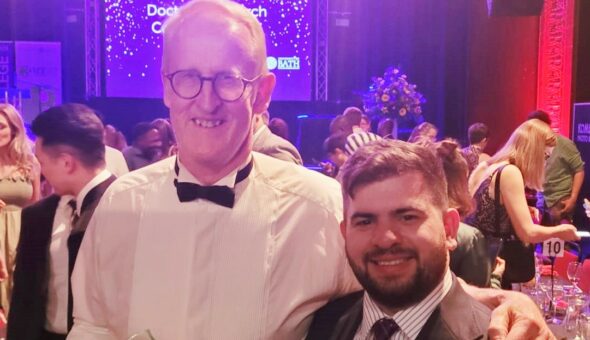Throughout September, the Business and Society blog will feature work from The International Centre for Higher Education Management (ICHEM) at the University of Bath School of Management. The centre brings together researchers looking at university leadership, management and policy in order to drive innovation in the sector.
Here Professor Emma Hunt, Vice Chancellor and Chief Executive of Falmouth University, reflects on the value of creativity and the creative economy in all our lives. She explains how creative skills are invaluable for driving innovation in all sectors, and how universities can help uplift and embed these skills.
There is no doubt we are living in difficult economic and geopolitical times. However, in challenging circumstances, creativity is more important than ever; to inspire, to entertain, to innovate. It’s our engagement with creativity that is powering and influencing one of the most important industry sectors of our era, the Creative Economy.
Woven through our everyday lives, the true value of creative skills might not be apparent to those who easily consume creative content, either as an individual or a national policy maker.
However, for those of us working in Higher Education in creative and cultural subjects, and those in relevant industries, it is very clear how creative skills are essential not only in the creative industries but for how they unlock growth and innovation across a range of sectors.
‘It’s the creative economy, stupid’
There is a national ambition to make Britain a Science Superpower, but this should be matched by ambitions to also be a Creative Superpower. To create a double superpower of global standing.
Too often, policy makers attempt to lower, belittle, or denigrate the arts and creativity as not worthy of public investment. Yet we see the economic impact these disciplines can have for the wider economy; on the environment, in wellbeing, and health. It’s these very creative subjects that are creating the work force of the future, and for those of us who work in higher creative skills, it’s our life blood.
My Doctor of Business Administration in Higher Education Management from the University of Bath thesis considered the implications of innovation, entrepreneurship and creativity on the changing skill sets needed for the economy. It also reflected that these should be constantly challenged and updated within our own more risk adverse and bureaucratic higher education sector. The variety of skills that have creativity at their heart is picked up in a forthcoming publication, due out in Autumn 2022, that I have co-edited: The Sage Handbook of Graduate Employability.
Many of my views on the importance of creative skills to constantly power the creative economy have been validated by my engagement with UK professional policy networks such as the former Parliamentary Design Commission and Local Enterprise Partnerships in Dorset and Cornwall.
In addition, Creative UK provides statistics to show that the creative industries contributed £115.9bn in Gross Value Added (GVA) to the UK economy in 2019, which is greater than aerospace, automotive, life sciences and oil and gas sectors combined. They represented almost 6% of the UK’s GVA, and supported a further £62.1 billion across the supply chain, totalling a £178 billion GVA contribution. Not that mention that they’re growing at four times the rate of the UK economy as a whole.
Why wouldn’t you want to invest in that?
‘Its creative life Jim but not as we know it’.
Just imagine your day, your way, your world view, as it currently is, and for many it will involve every aspect of the creative industries that make up the creative economy. Then imagine your day without the input from creatives. Where would be the joy? Your own creativity is enabled and enhanced by the creative work of others – you are a curator of creative possibilities.
From the moment you wake up and reach for your iPhone, there’s a world of creativity in your hands, which (through interfaces designed by creatives) you can explore from anywhere. Then as you step out the door, it enriches everything. From your consumption of news and culture to your fashion choices, your daily walk past architecturally designed buildings, the advertising and packaging that entices to you to buy, all the way through to the music, gaming, performance, film, or literature that might entertain you before the end of the day.
‘I heard the creative news today, oh boy’
When you engage with creativity you are accessing the results of an exceptional creative Higher Education system.
Creativity not only enhances our individual lives, but it can be part of the solution to some of society’s grand challenges; increasing our health and wellbeing, connected isolated communities, tackling climate change.
We hear on the news, daily, that one of the UK’s deepest recessions is in the making, but there is no recession on ideas or creativity, so let’s ensure these skills remain central to our education system.
A number of universities, certainly those where I have worked (e.g. Arts University Bournemouth, Derby University, and Huddersfield University) but also others, position creativity as an important part of their curriculum regardless of subject discipline. Much of the advanced education in the Sciences and Mathematics also revolves around creativity and innovative thinking to challenge assumptions and create new ideas and knowledge.
At Falmouth University, where I had the pleasure of taking up the reigns earlier this year, we are absolutely clear that Creativity is Everywhere. In our revised mission statement, we commit
‘To deliver exceptional education and research by harnessing the future of creativity and technology as foundations for the future economy. To use our knowledge and expertise in these disciplines to generate positive and sustainable outcomes for all’
While some commentators of developments in Higher Education see REF related outputs and the creative sector as oppositional, I would argue that it is possible to hold both in balance.
For example, at Falmouth University we are playing our part to ensure that the local creative economy remains buoyant through start-ups, where 27% of our students go on to set up their own business or become self-employed. And through our research where 100% of Falmouth University’s research impact case studies (all creative subjects) and 63.4% of its research outputs have been rated as being world-leading or internationally excellent in the REF2021. All our impact case studies were focussed on addressing issues facing our local region that can be replicated elsewhere and reinforces the value of our subject to the local economy and the levelling up agenda.
‘Game on’
The creative economy is very attractive to new generations of students, and we are seeing growth in many areas of CreaTech, including immersive and convergent technologies. Falmouth along with others, are aligning with the exciting potential of CreaTech - this can be seen through the growth of our Games Academy which, since its launch in 2015, has grown to around 1000 undergraduate, postgraduate and postgraduate research students and ranked as one of the best places in the world to study Game Design by the Princeton Review.
So, for me it’s ‘game on’ to ensure the creative economy remains central to our lives. Creativity, creative skills, and links to innovation and technology really matters right now for us personally and globally.
Responses




Great post, we need to create the infrastructure for the creatives to shine which requires a shared drive to deliver against a strong strategy. Use the best to build the tracks and the creatives will flower